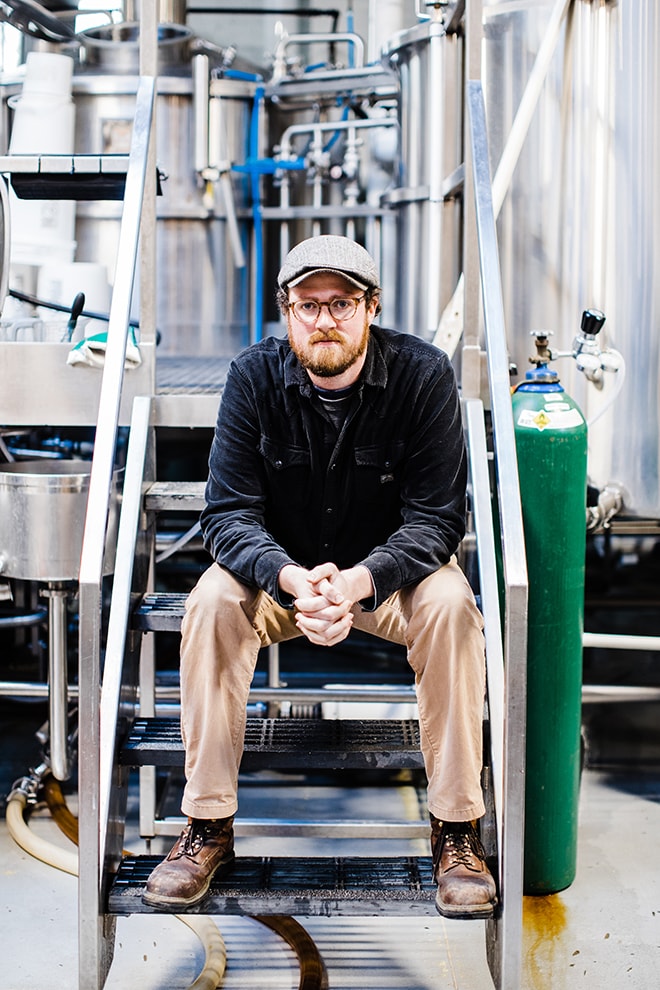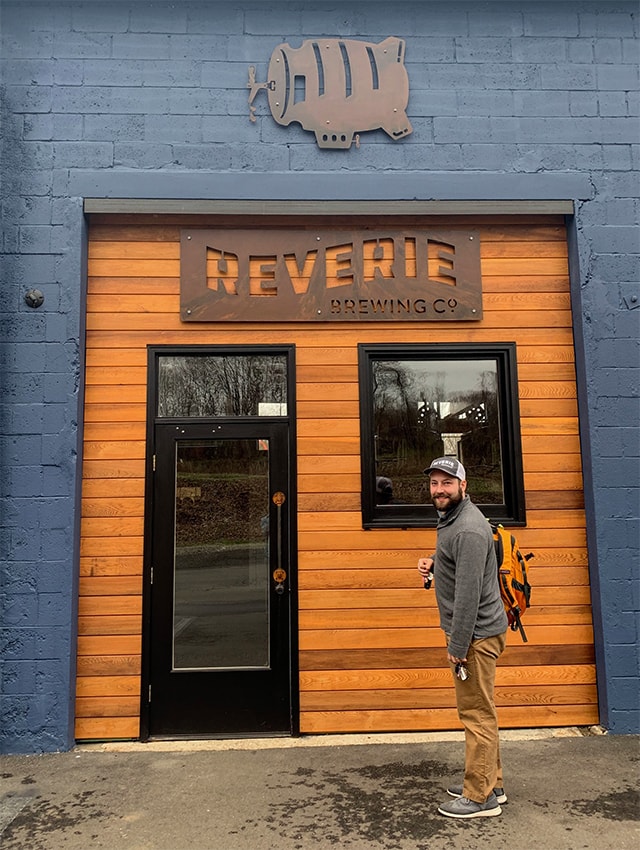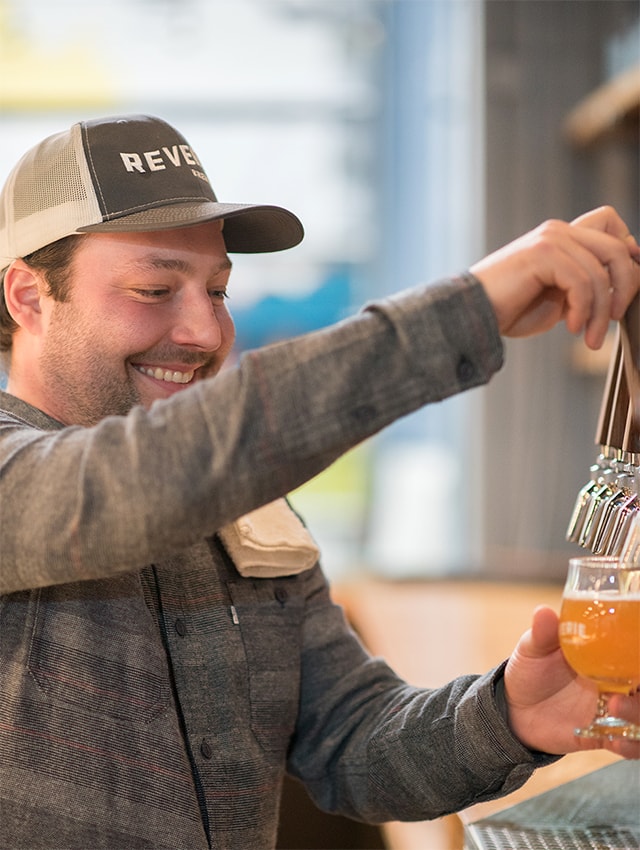
Loyola alumni forge separate paths to open craft breweries in New England
How two Loyola alumni came to run two of New England’s most exciting craft breweries
When Ryan Broderick enrolled at Loyola in 2005, craft beer was still a daydream.
National brands like Sierra Nevada and Dogfish Head had pioneered the way, but the industry was still a decade away from becoming the percolating $22 billion business it is today.
But Broderick saw big things coming thanks to his relationship with his father. The elder Broderick was sharing Harpoon IPA with his son well before that beer was available on every tap line in their home state of Connecticut, and the two cultivated a passion together.
“We always had this huge love of craft beer together,” says Broderick, who majored in marketing and earned his BBA from Loyola in 2009. “I would come home from Loyola and bring some beer from Baltimore, and he would go on camping trips and bring something back from Vermont.”
In 2017, when Broderick completed his MBA at Loyola with a concentration in finance, there were 60 craft breweries operating in Connecticut. Today the Brewer’s Association counts 112—including Reverie Brewing, which Broderick opened with his father in February 2019.
At the time, Broderick was an investment banker and an avid (though, in his words, “very below average”) homebrewer who would spend afternoons dreaming about playing hooky on the golf course and running his own brewery. It wasn’t until a Loyola friend introduced Broderick to Frank Lockwood, Reverie’s co-founding head brewer, that the daydream started to solidify.
“Don’t quit your daydream”
Reverie’s tagline, “Don’t quit your daydream,” was inspired by the mind-wandering afternoons Broderick spent while working as an investment banker. The entire operation is a tribute to taking his Loyola business education and his familial love of beer and combining them into his own creative meandering.
“Reverie means to be lost in your thoughts or in a pleasant daydream,” Broderick explains. “That’s why our logo is like a blimp. Imagine you’re at a work meeting, and you get distracted looking at the window, and you’re like ‘ooh, a blimp!’”
To visitors to the Newtown, Conn., taproom, Broderick recommends sampling a few of his favorite Reverie beers: Sourry Not Sourry (Gruit), Viva La Lager (Mexican Lager), and Double Dipper (Double IPA).
Feet first in foam
Meanwhile, fellow Greyhound Tyler Fitzpatrick jumped into the beer business right after he graduated from Loyola in 2010 with his BBA in Accounting. Working a post-graduate photography internship for the Baltimore Orioles, Fitzpatrick spent days selling wine and learning about fermentation at Wine Market Bistro. But the work wasn’t paying rent and his appetite was whetted for something bigger in the industry.
When he saw the opportunity to work as an intern at Cape Cod Beer, he moved north. A summer later, he transitioned to a full-time production assistant. Before long, he moved from Cape Cod Beer to Wormtown Brewery to Mystic Brewing.
Boston is a bustling beer town, with 42 breweries in Greater Boston alone. The thirst for new, exciting beers is insatiable, and when Fitzpatrick had the opportunity to come on as a part-owner and head brewer at a new startup in Cambridge, he leapt.
 Tyler Fitzpatrick takes a break in his brewhouse at Lamplighter Brewing. Photo courtesy of Alyssa Parker Photography.
Tyler Fitzpatrick takes a break in his brewhouse at Lamplighter Brewing. Photo courtesy of Alyssa Parker Photography.
Lamplighter Brewing opened in 2016, with Fitzpatrick bringing all the learnings of his vagrant career into a welcoming taproom-coffee shop hybrid on Main Street. Success came swiftly: The taproom is constantly packed, and their Lazy Tiger IPA won a Great American Beer Festival silver medal in 2020.
“We are a community space; we want this to be people’s third place,” says Fitzpatrick, who still lives in Boston. “It’s important to have a wide range of beers. We’re going to have IPAs, we’re going to have many traditional English or Belgian beers, we’re going to have some lighter lagers or more complex lagers, and we’re going to have a couple fairly funky beers. That tap list is a big part of our brand.”
His personal favorites include the Apollo Sunshine (Pilsner), Metric Systems (Gose), and You Won't (American IPA).
Byways to brewing
Broderick and Fitzpatrick didn’t know each other while studying at Loyola; they shared a passion for beer, and they’ve forged distinct careers in craft beer. Today they are both business owners in the same burgeoning industry in the same region, bound by their Loyola business educations and experiences.
It’s all about having the right attitude, being humble and being open to learning about something that you are passionate about.
Unsurprisingly, each took a different lesson from their time on the Evergreen campus. For Broderick, the Loyola community carried him from his desk job to the brewhouse. His wife, Alison Sampson Broderick ’09, who he met at Loyola, supported his dream; his investors consist of fellow Greyhounds, and on opening day at Reverie, two of his club hockey teammates drove down from Boston to support their former captain.
Fitzpatrick—who also met his wife, Katie DeFonzo Fitzpatrick, ’10, at Loyola—says the Jesuit core values have resonated most in his career. The finance and advertising classes he took in the Sellinger School of Business and Management help with day-to-day business management; however, the former Evergreen is thankful for the way Loyola taught him how to think. He fondly remembers philosophical discussions with Catriona Hanley, Ph.D., associate professor of philosophy—and how they still inspire him today.
“That really shaped the mentality I use to approach everyday life,” he says. “Business came very natural to me, but a lot of the [core curriculum] classes in the first few years were very helpful in learning a wide range of things.”

 Left: Broderick shows up to work at Reverie's taproom. Right: Broderick pouring a tasting for a guest at Reverie.
Left: Broderick shows up to work at Reverie's taproom. Right: Broderick pouring a tasting for a guest at Reverie.
What Fitzpatrick and Broderick both agree on is that breaking into their industry is not something a liberal arts education can fully prepare you for. Yes, you can build a network of supporters and you can learn practical and intellectual skills, but the beer industry is best learned through doing.
“There’s two ways to get into business,” Broderick says. “Having a management background and having your financial background is great, but if you walk into a brewery and say, ‘Hey, I want to intern for the summer squeegeeing floors,’ they won’t to say no to you.”
Fitzpatrick concurs. Brewing is a much bigger industry than when he first entered, but the founding principles apply. You can’t learn the whole business in a classroom. You need to get your waders on and do the work.
“It’s all about having the right attitude, being humble and being open to learning about something that you are passionate about,” Fitzpatrick says. “It’s about work ethic at the end of the day, if you put in hard work at a decent company, you’ll go pretty far.”